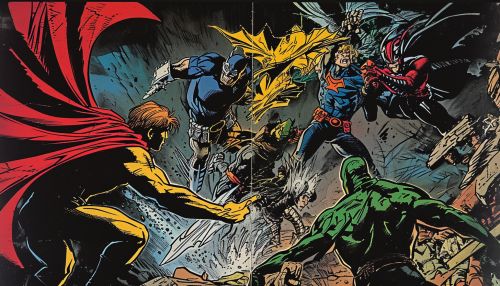Modern Age of Comic Books
Origins of the Modern Age
The Modern Age of Comic Books, also known as the Dark Age, is a period in the history of American superhero comic books which is generally considered to have begun in the mid-1980s and continues through the present day. During this time, comic books became increasingly complex and sophisticated, exploring darker and more psychologically nuanced narratives that reflected the rapid cultural changes of the time.
The Modern Age is often said to have begun with the publication of two groundbreaking works: Alan Moore's Watchmen and Frank Miller's The Dark Knight Returns. These works, along with others such as Crisis on Infinite Earths, Batman: Year One, and The Killing Joke, ushered in a new era of storytelling in comics, characterized by a focus on character development, moral ambiguity, and a willingness to tackle social and political issues.


Characteristics of the Modern Age
The Modern Age of Comic Books is characterized by a number of distinct trends and developments. One of the most significant is the shift towards darker and more mature themes. This is often attributed to the influence of writers like Alan Moore and Frank Miller, who brought a new level of psychological depth and complexity to their characters. This trend was also reflected in the artwork of the period, with artists such as Todd McFarlane and Jim Lee introducing a more detailed and dynamic style.
Another key feature of the Modern Age is the rise of independent publishers and the diversification of the comic book market. Companies like Image Comics and Dark Horse Comics emerged as major players, offering an alternative to the traditional superhero fare of Marvel and DC Comics. This period also saw the growth of the graphic novel format, with works like Maus and Persepolis gaining critical acclaim and mainstream recognition.
The Modern Age also saw significant changes in the way comic books were distributed and sold. The direct market, in which comic books are sold directly to specialty stores rather than through newsstands, became the dominant method of distribution. This allowed for greater experimentation and diversity in the types of stories being told, as well as a shift towards a more adult-oriented audience.
Impact and Influence of the Modern Age
The Modern Age of Comic Books has had a profound impact on the medium and the wider popular culture. The darker and more complex storytelling of this period has been influential in shaping the perception of comic books as a legitimate form of art and literature. Works like Watchmen and The Dark Knight Returns have been recognized as some of the greatest graphic novels of all time, and have been adapted into successful films and television series.
The rise of independent publishers during the Modern Age has also had a lasting impact, leading to a more diverse and vibrant comic book industry. The success of Image Comics, in particular, has paved the way for other creator-owned publishers, and has challenged the dominance of Marvel and DC.
The Modern Age has also seen comic books become increasingly integrated into mainstream culture. The popularity of comic book adaptations in film and television, as well as the growth of comic book conventions and the rise of digital comics, can all be traced back to developments during this period.
Criticisms and Controversies
While the Modern Age has been a time of innovation and growth for the comic book industry, it has also been marked by controversy and criticism. The darker and more violent tone of many comics during this period has been a source of controversy, with critics arguing that it has led to a loss of innocence and fun in the medium.
The rise of the direct market has also been criticized for leading to a narrowing of the audience for comic books, with the focus on adult-oriented content and collector's items seen as alienating younger readers. The speculator boom of the early 1990s, in which comics were bought in large quantities in the hope that they would increase in value, led to a market crash and a period of instability for the industry.
Despite these criticisms, the Modern Age has been a time of significant change and development for the comic book industry, and its impact can still be felt today.
